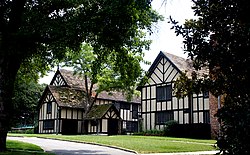Agecroft Hall
|
Agecroft
|
|
 |
|
| Location | 4305 Sulgrave Rd., Richmond, Virginia |
|---|---|
| Coordinates | 37°33′10″N 77°30′23″W / 37.55278°N 77.50639°WCoordinates: 37°33′10″N 77°30′23″W / 37.55278°N 77.50639°W |
| Area | 23.1 acres (9.3 ha) |
| Built | 1926 |
| Architect |
Henry G. Morse (restoration) Charles Gillette (landscape) |
| Architectural style | Tudor-Tudor Revival |
| NRHP Reference # | 78003186 |
| VLR # | 127-0223 |
| Significant dates | |
| Added to NRHP | December 13, 1978 |
| Designated VLR | July 18, 1978 |
Agecroft Hall is a Tudor manor house and estate located at 4305 Sulgrave Rd. on the James River in the Windsor Farms neighborhood of Richmond, Virginia, United States. The manor house was built in the late 15th century, and was originally located in the Irwell Valley at Agecroft, Pendlebury, then in the historic county of Lancashire, England, but by the 20th Century it was unoccupied and in a state of disrepair.
Mr. Thomas C. Williams, Jr. of Richmond, Virginia, a wealthy entrepreneur, purchased Agecroft Hall upon the advice of his architect, Henry G. Morse. During the Country Place Era, when many wealthy American families were building extensive country estates emulating those they had seen in Europe, Mr. Williams, whose business interests included tobacco, banking, and shipping wished to build a true English manor house on his 23 acre estate overlooking the James River. The manor house was dismantled, crated, transported across the Atlantic, and reconstructed in Richmond's Windsor Farms neighborhood - then a fashionable new neighborhood being developed by Mr. Williams on the Williams' family farm site, which had long been known as 'Windsor.'
The architect, Mr. Morse, was retained to oversee the reconstruction. The intention was not to replicate Agecroft as it had stood in Lancashire, but rather to create a functional and comfortable mansion reminiscent of its English predecessor. The original floor plan was abandoned and many 20th century conveniences were included. Reconstruction took two years and cost approximately $250,000, a considerable sum for that time. The project was completed during the spring of 1928.
The following year Mr. Williams died. With great foresight and generosity, he had stipulated in his will that upon his widow's death or relocation, Agecroft Hall would become a house museum.
...
Wikipedia


